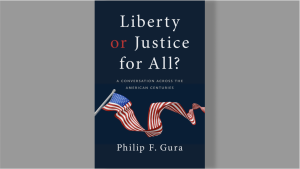This February, DOECL Professor Philip Gura published a new book titled Liberty or Justice for All?: A Conversation across the American Centuries through the University of Georgia Press. This book brings together the work of Jonathan Edwards, Ralph Waldo Emerson, William James, and John Rawls on the topic of the just society.
Liberty or Justice for All? “traces a striking pattern—the vexed relationship of individual liberty to inclusive social justice—in an elaborate fabric, woven over more than three centuries of American history.” This book is a riveting story of faith, politics, and ideas that brings to life four of America’s greatest thinkers, whose dialogue across the ages has never been more relevant.
Professor Gura has dreamed of working on this project since the beginning of his academic career:
“Many years ago, when I was a graduate student, one of my mentors pointed to a row of books on the top shelf of his bookcase and said that they were by the four greatest thinkers the country had produced. I never forgot that day and always dreamed of doing a book that centered on them, to try to figure out what that teacher meant. This is the result.”
Professor Gura’s favorite part of this project was “without doubt” working with John Rawls’ work:
“I had never written about someone who was virtually my contemporary and had a steep learning curve to be able to understand his contribution to the philosophy of social justice, and how what he thought fit with the ideas of the other of my subjects.”
All through his career, Gura has prided himself in not repeating himself–he always pushed to take on different subjects and methods of inquiry:
“At one point, I spent several years learning about nineteenth-century music history; at another, about the subtleties of American Puritan radicalism; at another, about the development of the nineteenth-century novel; at another, about the varieties of antebellum reform. To be sure, before this I had written an intellectual biography of Edwards and had given some pages to Emerson’s contribution to Transcendentalism; but my focus herein on civic discourse took me into more new territory. Challenging myself in this way, I never have been bored with what I do.”
Congratulations, Professor Gura!


